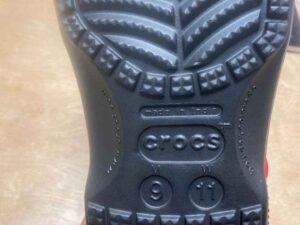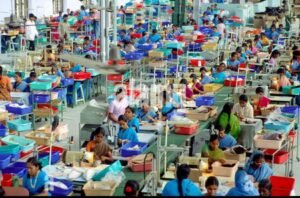India has entered the non-leather footwear industry by producing Crocs at a recently constructed footwear park in central Tamil Nadu’s Perambalur.
Beyond Crocs, major brands like Nike, Adidas, and Puma will also be producing shoes in Tamil Nadu through Taiwanese conglomerates. This change is in line with a worldwide movement to diversify supply chains and manufacturing by implementing a China+1 strategy. Triggered by the environmental benefits of non-leather footwear, robust manufacturing activities in Tamil Nadu, and a resilient workforce of women, this development has implications for diversity, sustainability, and foreign investment.

Tamil Nadu has carved out an amazing investment arc for itself with this first-mover advantage, spanning from cars to electronics to non-leather footwear.
To put things in perspective, India exported $4.25 billion worth of leather goods in 2022, accounting for 13% of the world market. Tamil Nadu contributed a significant 48% of this total. Renowned premium labels like Ferragamo, Prada, and Louis Vuitton use leather from this state. In comparison, India’s 2021–2022 fiscal year exports of non-leather footwear were just $214 million. But this situation is about to change thanks to Tamil Nadu.
China+1 strategy
China Plus One, commonly referred to as Plus One or C+1, is a business strategy that aims to diversify income sources and avoid focusing solely on China. It can also direct investments towards manufacturing in other developing nations that show promise, such as Thailand, Vietnam, or India, the nation with the largest population and fastest-growing major economy.
Shoetown, Feng Tay, Pou Chen, and Hong Fu are the Big Four of the non-leather footwear market, which covers everything from sandals to heels to sports shoes to bathroom slippers. These businesses together manufacture the full line of footwear for firms including Converse, Nike, Adidas, Reebok, Puma, and Crocs. At the moment, all four are setting up shop in Tamil Nadu, and a fifth large contract manufacturer might be joining the fray.

Taiwan’s arrival into Tamil Nadu is seen by many market observers as a step towards fulfilling India’s aspirations for manufacturing. However, geopolitics plays a significant role, and timing is crucial. The agreement has been made sweeter by Taiwan’s positive business links with India. It also helps that industrial parks like Perambalur are close to Chennai and all of Tamil Nadu’s ports, and that Tiruchirapalli airport now has direct flights to Southeast Asian nations.
“The China+1 window is now open, but it won’t stay open for long,” stated Irshad Mecca, director of Farida Shoes, a renowned producer and exporter of leather goods situated in Ambur, the leather heartland. According to him, India has around three years to establish itself and defeat rivals in the footwear market like Bangladesh and Indonesia.
Made-in-India Initiative
With Tamil Nadu just being the beginning, manufacturers are excited. “Atmanirbhar Bharat is a significant initiative,” stated Dr. Rafiq Ahmed, the head of the Phoenix Kothari Group, which established the Crocs plant in Perambalur. “States where employment is necessary should attract more of this kind of industry.”

Phoenix Kothari’s successful partnership with Shoetown has created a good precedent for other domestic athletes. Following this achievement, Ahmed has had offers from other states, including Odisha, asking him to build factories there and offering large subsidies for joint ventures with Taiwanese businesses. Maharashtra and Madhya Pradesh have also shown interest in joining this expanding sector.
With make-in-India initiative started back in 2014, this is one of the major developments in this initiative by Tamil Nadu becoming a new non-leather footwear manufacturer and this marks the beginning of an era of products made in India. The success of the footwear park will further influence the broader Indian manufacturing ecosystem where the TATA group has also followed up and will produce India’s first homegrown iPhone











Comments 1